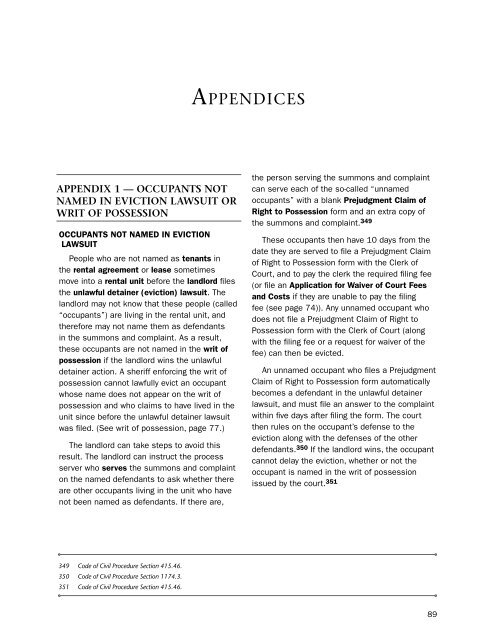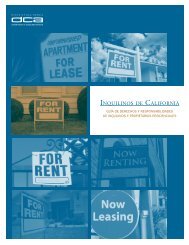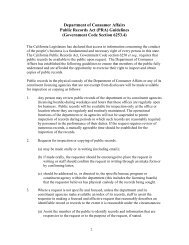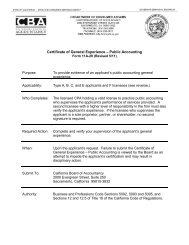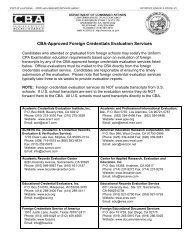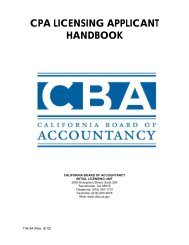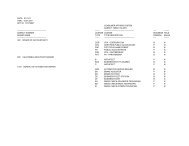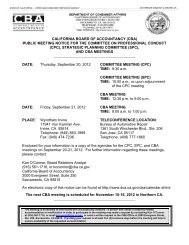California Tenants - Department of Consumer Affairs - State of ...
California Tenants - Department of Consumer Affairs - State of ...
California Tenants - Department of Consumer Affairs - State of ...
You also want an ePaper? Increase the reach of your titles
YUMPU automatically turns print PDFs into web optimized ePapers that Google loves.
aPPendIX 1 — occuPants not<br />
naMed In evIctIon lawsuIt or<br />
wrIt oF PossessIon<br />
occuPaNts Not Named iN evictioN<br />
lawsuit<br />
people who are not named as tenants in<br />
the rental agreement or lease sometimes<br />
move into a rental unit before the landlord files<br />
the unlawful detainer (eviction) lawsuit. the<br />
landlord may not know that these people (called<br />
“occupants”) are living in the rental unit, and<br />
therefore may not name them as defendants<br />
in the summons and complaint. As a result,<br />
these occupants are not named in the writ <strong>of</strong><br />
possession if the landlord wins the unlawful<br />
detainer action. A sheriff enforcing the writ <strong>of</strong><br />
possession cannot lawfully evict an occupant<br />
whose name does not appear on the writ <strong>of</strong><br />
possession and who claims to have lived in the<br />
unit since before the unlawful detainer lawsuit<br />
was filed. (see writ <strong>of</strong> possession, page 77.)<br />
the landlord can take steps to avoid this<br />
result. the landlord can instruct the process<br />
server who serves the summons and complaint<br />
on the named defendants to ask whether there<br />
are other occupants living in the unit who have<br />
not been named as defendants. if there are,<br />
349 Code <strong>of</strong> Civil Procedure Section 415.46.<br />
350 Code <strong>of</strong> Civil Procedure Section 1174.3.<br />
351 Code <strong>of</strong> Civil Procedure Section 415.46.<br />
appendiCes<br />
the person serving the summons and complaint<br />
can serve each <strong>of</strong> the so-called “unnamed<br />
occupants” with a blank Prejudgment claim <strong>of</strong><br />
right to Possession form and an extra copy <strong>of</strong><br />
the summons and complaint. 349<br />
these occupants then have 10 days from the<br />
date they are served to file a prejudgment Claim<br />
<strong>of</strong> Right to possession form with the Clerk <strong>of</strong><br />
Court, and to pay the clerk the required filing fee<br />
(or file an application for waiver <strong>of</strong> court fees<br />
and costs if they are unable to pay the filing<br />
fee (see page 74)). Any unnamed occupant who<br />
does not file a prejudgment Claim <strong>of</strong> Right to<br />
possession form with the Clerk <strong>of</strong> Court (along<br />
with the filing fee or a request for waiver <strong>of</strong> the<br />
fee) can then be evicted.<br />
An unnamed occupant who files a prejudgment<br />
Claim <strong>of</strong> Right to possession form automatically<br />
becomes a defendant in the unlawful detainer<br />
lawsuit, and must file an answer to the complaint<br />
within five days after filing the form. the court<br />
then rules on the occupant’s defense to the<br />
eviction along with the defenses <strong>of</strong> the other<br />
defendants. 350 if the landlord wins, the occupant<br />
cannot delay the eviction, whether or not the<br />
occupant is named in the writ <strong>of</strong> possession<br />
issued by the court. 351<br />
89


